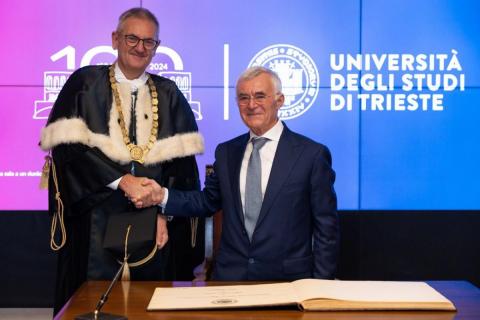The University of Trieste has awarded an honorary degree in Medical Biotechnology to Prof. Rino Rappuoli, head of research at the Fondazione Biotecnopolo di Siena and the National Pandemic Centre (Centro nazionale anti pandemico – CNAP), and leading international figure in the research and development of a new generation of vaccines.
A reference point for the scientific community during the Covid-19 pandemic, Rappuoli has been working on second-generation monoclonal antibodies against SARS-CoV-2 since 2020. He is considered the father of reverse vaccinology, a technology now used to develop vaccines from genomes.
His extensive research activity, now spanning 40 years, has consisted of 795 original scientific publications and several books. He was also recently awarded a 2.5 million euro ERC Advanced Grant for a research project on the development of new monoclonal antibodies.
Throughout his career, Rappuoli has received many public awards and prizes: from being appointed to prestigious international scientific organisations to being awardedthe Gold Medal of Merit for services to public health in 2005. Always committed to making global health sustainable, the Italian microbiologist founded the GSK Vaccines Institute for Global Health, an institute that develops vaccines for developing countries.
From an academic point of view, Rappuoli is an Honorary Professor of Vaccinology at Imperial College London and Senior Professor at the University of Siena.
In his lectio magistralis, entitled 'I vaccini del futuro e la conquista di traguardi impossibili’ (future vaccines and achieving impossible goals), Rappuoli stressed the importance of vaccines in recent history and outlined how we are going to beat off two major challenges through the development of mRNA vaccines: blocking antibiotic-resistant superbugs and fighting cancers, probably starting with melanoma.
'It is a great honour for me to receive this important award from one of our country's leading university institutions,' Rappuoli commented. ‘The health challenges ahead of us are still numerous and compelling, and we have a duty to continue along the road of research and innovation, because only through them will we have the opportunity to increase the knowledge we can pass on to future generations'.
Rappuoli also stressed the importance of research on cancer vaccines: 'There is a very promising initial study that has not yet been published but has been reported at congresses, a collaboration between Merck and Moderna, on a case of melanoma where a personalised vaccine was given in addition to the normal therapy. Those who also received the customised vaccine had a 65% decrease in recurrence or mortality. This is a new and promising area and the first time we are seeing results like this, so new horizons are opening up'.
The honorary degree ceremony was part of UniTS Graduation Day where 129 new PhD graduates were presented to the public and celebrated with the traditional 'cap toss'.
Graduation Day 2023 established two very significant new records for the University of Trieste. For the first time among the new PhDs women (67) outnumbered men (62). International presence was also more prominent than ever, with 16% of the new PhDs coming from abroad.




